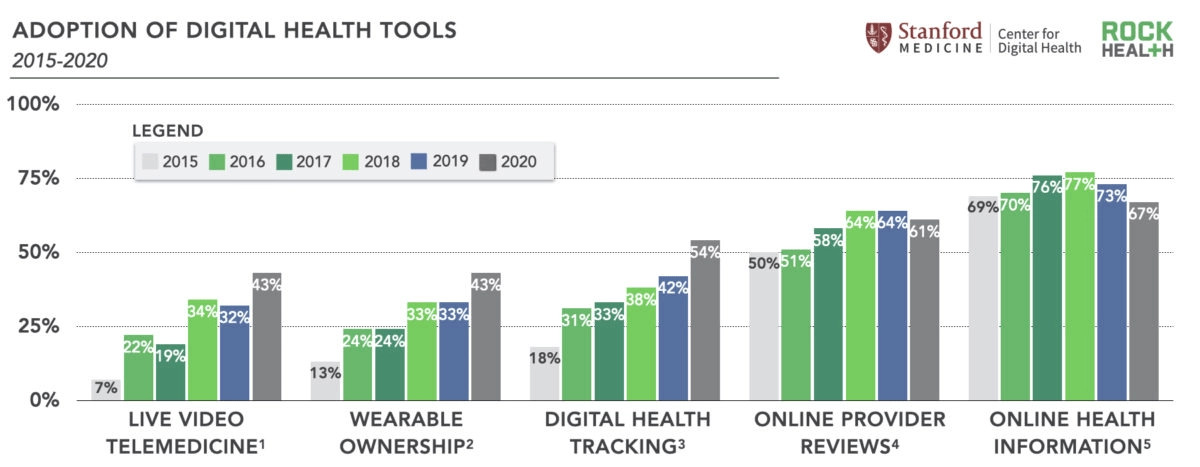

Digital healthcare digest — February of 2021
- New products and launches in the digital healthcare industry
- Digital health startup funding in February
- Digital healthcare market news, deals, and partnerships
- Regulations and clearances in digital health
- Data protection and security threats in healthcare
- Science and business research in digital healthcare
We haven’t seen sunlight for six months - don’t know about you, but we are glad that it’s March already. It also means that it’s time to review the latest news from the digital health industry: from Google’s apparent domination all over the place to small startup’s funding to a cyberattack doom that hovers over healthcare and causes twice more damage than just a year ago.
New products and launches in the digital healthcare industry
Respiray, a UV tech company from Estonia, released a wearable air purifier that, according to them, kills almost 100% of bacteria and viruses in front of the person that uses it. People wear it around the neck, and it disinfects the air through an internal filter and UV-C light before it reaches their faces.
PatchAi, a startup from Italy, and Roche, a well-known pharma giant, will launch a digital platform for patients with oncology diseases. They want to improve self-management through tracking and journaling, adherence control, and insights gathering through outcomes reporting; that is to improve sinking rates of visits to oncologists caused by the pandemic.
Google Health will release a wellness feature that measures users’ heart and respiratory rate readings through their smartphone’s camera to its Google Fit app. Google also releases Care Studio, a search tool for clinicians that aims to help organize patients’ medical records - the company tries to beat EHRs’ navigation challenges, providing a unified view of patients’ health records across different EHRs.
Fitbit, on the other hand, adds a blood glucose tracker to their connected app.
CMS Surgical’s (CMR) robots - Versius Robotic System - is introduced to the German healthcare market. They’ve been adopted by Saxony hospital Klinikum Chemnitz. Robots will provide surgeons and medical teams assistance in minimal access surgeries.
Current Health, a developer of a remote patient monitoring platform, launched an initiative for building diverse longitudinal datasets for decentralized clinical trials. It’s called Community, and it stores data from Current Health’s FDA-cleared monitoring devices.
Masimo, a company that develops med-devices, releases a solution to help businesses, schools, and other organizations to reopen. The device is called SafetyNet-OPEN, it’s built upon the company’s remote monitoring system they’ve developed when the pandemic has started; it tracks’ infection risks, possible exposures, monitors user’s vitals, and generates risk scores, tailored to recommendations on improving user’s well-being.
98points6, a startup that does app-based primary care, will integrate behavioral health services to their offering for employers, health plans, and health systems. Users will get access to licensed therapy, behavioral health coaches, and behavioral digital health programs for self-management.
TikTok, Instagram, and Pinterest collaborated with American National Eating Disorders Association (NEDA) to address, raise awareness, and prevent eating disorders. Now, if users will be searching for content related to eating disorders, they will receive educational content and supportive visuals with body positivity, access to local support hotlines, and other platform-specific resources.
Digital health startup funding in February
Maya, a startup from India that is already working in Bangladesh and Singapore, got $2.2M in seed funding. Mayo simplifies access to healthcare for women, especially requests concerning reproductive and mental health, and its team plans to use new funds to introduce new telehealth services and expand towards new markets - in particular, to Southeast Asia.
Mightier, a spin-out of Boston Children’s Hospital, teams up with Magellan Health to study how Mightier’s video-game-based therapy can improve emotional regulation for children with ADHD, anxiety, and oppositional defiant disorder. Their tech comprises 25 mobile games and a special band that monitors heart rate. The study received $2M from the National Institute of Mental Health.
Folx Health, a virtual care startup that is focused on the LGBTQIA+ community, raised $25M. They plan to expand to all American states and increase the number of services for queer and trans communities.
Infinitus, a startup that applies robotic process automation (RPA) to voice communication between different entities in the American healthcare industry, raised $21.4M. Their “voice RPA” becomes a machine-generated voice that calls from, for instance, hospitals to pharmacies and asks humans on the other end questions that are needed to authorize a certain payment. They receive info and transfer it to a physician.
Equip, a company that develops virtual care programs for people with eating disorders, raised $13M in Series A. They use family-based treatment and it’s mostly targeted at children, teens, and young adults. Programs encourage all family members to help a person to overcome their disorder: they provide them with resources and skills to apply when doing so. FBT is evidenced to be more effective than traditional treatment.
Botco.ai, a HIPAA-complaint solution for conversational marketing, raises $2.2M in seed funding. They’ll use the funding to integrate with EHR systems and platforms for marketing automation; right now, they offer AI-based chatbots, training, life data dashboards for chatbots, and integration with different tools hospitals, clinics, and other healthcare providers use.
Casana, a company, formerly known as Heart Health, that develops heart sensor toilet seats, raises $14M in Series A and plans to use the funds to get their product to the market. Their goal is to monitor patients’ vitals seamlessly, without interruptions, at-home.
Digital healthcare market news, deals, and partnerships
Ginger’s users now can receive and manage their meds for mental health from home due to the company's partnership with Capsule, a digital pharmacy.
Flow Neuroscience that specializes in depression space purchased Halo, a med-tech company that is mostly known for its headset for enchanting movement performance.
Thomson X, a platform that connects technological startups with healthcare experts and networks, and Plano, an eye care company, have partnered to address the increase in myopia across Asia.
Suzhou Basecare Medical, a unicorn company from China that developed a PGT-A test kit for embryo screening that detects developmental defects and promotes healthy development, went IPO on Hong Kong Stock Exchange.
Owlet Baby Care, a developer of infant-monitoring products, will merge with SPAC, Sandbridge Acquisition Corporation, and will start trading on the NYSE. The partnership allows Owlet to pour more money into product and growth, and increase the quality of the nursing experience.
23andMe goes public through the SPAC merger, too: their partner is VG Acquisition Corp.
Hybrid healthcare provider, Premise Health, will buy Sonic Boom Wellness, a solution for corporate wellness. Premise Health will tap into Sonic Boom’s platform that tracks users’ activity, health habits, and so on, - and will provide their users with these features to improve users’ well-being and care management.
Modern Health, a company for digital mental health and wellness, buys Kip, a startup for behavioral health. Kip matches clients to qualified therapists and offers their hybrid care after pairing is complete. Modern Health, which is mostly oriented to employers, will integrate Kip to enhance communication with patients and personalization through analytics, simultaneously improving user’s health awareness.
Oscar Health, a digital insurance company, goes IPO on Nasdaq.
Regulations and clearances in digital health
FDA cleared DeNovo’s first device treatment for obstructive sleep apnea that is used when a patient is awake - eXciteOSA. It’s a tongue muscle stimulation device for people aged 18 or older that is intended to reduce mild sleep apnea and snoring.
AppliedVR, which has just completed their randomized clinical trial that showed their VR program has been efficient in reducing chronic lower back pain (42% reduction in intensity) will seek FDA clearance.
Data protection and security threats in healthcare
Cyberattacks on healthcare doubled in 2020, and 28% of them are caused by ransomware.
API security company Approve released an investigation that highlighted systemic security shortcomings among major healthcare apps; for instance, each one of them has been susceptible to a broken object-level authorization attack (BOLA attack - when hackers adjust their resource to “pretend” to be user’s resource using user’s ID in the API call) that allowed hackers to access PHI and identifiable info like X-rays and admission records.
A new report by CyberAngel released a report on how healthcare data is targeted and sold by cybercriminals.
Science and business research in digital healthcare
SNP (single nucleotide polymorphism) chips - a DNA microarray that is frequently used by consumer genomic companies - might have been very unreliable in identifying clinically relevant rare pathogenic variants, according to The MBJ, with lots of false positives that made people schedule unnecessary visits to the hospital and even go through not needed invasive procedures.
There are no evaluation systems, clear proof of efficiency, or standardized best practices of sleep app development and, according to JMIR (and yet there’s more than 500 of them in the App Store and Google Play Store.)
FDA states pulse oximeters are less accurate for people with darker skin, citing a recent report in the New England Journal of Medicine.

Check out Rock Health’s digital health consumer adoption report for 2020 on most used tools, willingness to share data, gaps in telemedicine adoption, and lots of other insights.
Otsuka Pharmaceutical from Tokyo launches a virtual study that will show if digital therapeutics (in particular, Click Therapeutic programs for depression and insomnia) can reduce depression symptoms in patients who are already taking antidepressants.
Digital healthcare vs COVID-19 in February of 2021
Buoy Health, a company that develops an AI triage chatbot among other things, will add a new vaccination tool in their solution for employers: it is supposed to increase awareness about vaccination and gauge employees’ interest in the procedure.
Google Cloud launches a tool for COVID-19 vaccine distribution for local governments. It’s a centralized platform to share info on vaccines, track distribution data, forecast coronavirus cases, and so on.
Two UAE-based health companies, YAS Pharmaceutical and Pure Health, partnered with Laipac Technology from Canada to launch AI-powered COVID-19 antigen tests. At the same time, the country's largest airline introduces a touchless travel experience that includes reduced prices for testing and a centralized app with locations of labs and doctors’ contacts. They expect customers to use the app to validate their results at check-ins.
Notable Health wants to use its automation platform to help increase efficiency and decrease costs of vaccine distribution through RPA, NLP, and machine learning.
That’s it! Hey, if you’d like to receive monthly news from the field to your inbox - usually accompanied by our articles on how to develop different software in the healthcare industry, subscribe to our newsletter below.
Tell us about your project
Fill out the form or contact us

Tell us about your project
Thank you
Your submission is received and we will contact you soon
Follow us

